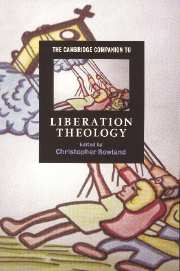Book contents
- Frontmatter
- Introduction
- Part one Contemporary liberation theology
- Part two Aspects of liberation theology
- 5 The origins and character of the base ecclesial community: a Brazilian perspective
- 6 The Bible and the poor: a new way of doing theology
- 7 Liberation and reconstruction: the unfinished agenda
- Part three Analysis and criticism
- Epilogue: the future of liberation theology
- Select bibliography
- Index
5 - The origins and character of the base ecclesial community: a Brazilian perspective
from Part two - Aspects of liberation theology
Published online by Cambridge University Press: 28 May 2006
- Frontmatter
- Introduction
- Part one Contemporary liberation theology
- Part two Aspects of liberation theology
- 5 The origins and character of the base ecclesial community: a Brazilian perspective
- 6 The Bible and the poor: a new way of doing theology
- 7 Liberation and reconstruction: the unfinished agenda
- Part three Analysis and criticism
- Epilogue: the future of liberation theology
- Select bibliography
- Index
Summary
Introduction
It seems that for every commentator who has put pen to paper or given voice upon the lecture circuit, there is set forth a different, and supposedly conclusive, definition of the base ecclesial community (comunidade eclesial de base). Ever since the emergence of this innovative and challenging ecclesial phenomenon within the Latin American continent, ecclesiologists and sociologists alike have fallen over themselves in an attempt to explicate the concrete, lived experiences of those within the base communities by way of their own preferred analytical vocabulary. The precision with which etymological origins, epistemological status and theological significance is sought, whilst laudable in terms of theoretical rigour, often belies the haphazard, disjointed and sporadic nature of much of the actual pastoral practice and tangible experience of those engaged in the day-to-day struggle to survive at the base of Latin American society.
As the above intimates, it is not our intention here to understand the base ecclesial community by means of dissecting the words comunidade, eclesial, de base. Rather, we shall explore the character of the comunidade eclesial de base (hereafter, CEB) by way of highlighting a number of landmark events and experiences which, over the course of at least a decade, played a constitutive part in the emergence of the CEB phenomenon. To this end, we seek to understand the CEB, not as a neatly definable entity, but rather as an ecclesial tool and lived experience which has emerged out of a prolonged series of pastoral crises, perceived threats, ecclesiological shifts, theological refinements, and historical exigencies born of a whole gamut of economic, political, social, and theoretical upheavals.
- Type
- Chapter
- Information
- The Cambridge Companion to Liberation Theology , pp. 109 - 128Publisher: Cambridge University PressPrint publication year: 1999
- 4
- Cited by

